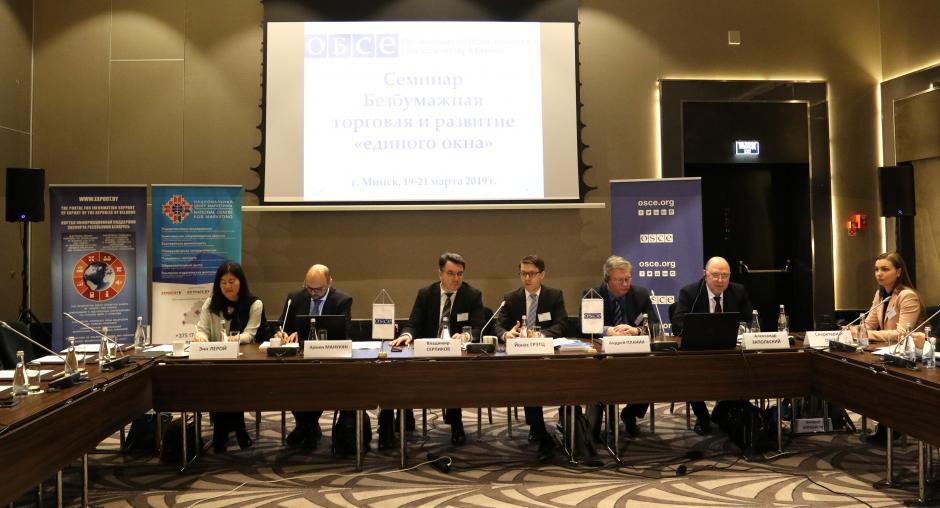Adaptation of Belarus to key provisions of the WTO Trade Facilitation Agreement in focus of workshop co-organized by OSCE in Minsk

Digitalization and simplification of import, export and transit procedures was the focus of a workshop organized by the Office of the Co-ordinator of OSCE Economic and Environmental Activities (OCEEA) together with the United Nations Commission on International Trade Law (UNCITRAL) and with the support of the World Customs Organization and the National Centre for Marketing and Price Study of the Foreign Ministry of Belarus from 19 to 21 March in Minsk, Belarus.
The workshop gathered some 30 participants from different government agencies of Belarus, research institutions, and the business sector. They discussed how to find the right approach to developing paperless trade and a single entry point for submission and receipt of trade documents in Belarus, while ensuring ease of use businesses and interoperability with trade partners. Such a single entry point is a key provision in the WTO Trade Facilitation Agreement.
Ambassador Vladimir Serpikov of the Ministry of Foreign Affairs of Belarus, Chief Negotiator in the process of accession to the WTO, said: “I am confident that the seminar will make an important contribution with regard to the adaptation of Belarus to key provisions of the WTO Trade Facilitation Agreement, which is an important element in the negotiation process on the country’s accession to the WTO.”
Participants in the three-day workshop learned about and discussed best practices, new developments, and available international standards with regard to paperless trade and development. Experts from the World Customs Organization, UNCITRAL, the Directorate-General for Taxation and Customs Union of the European Commission, as well as from government agencies of Belarus put a special focus on the technology neutrality and regional and international interoperability of national solutions.
“Paperless trade and development of a single window will ease procedural burdens and make trade procedures more predictable,” said Jonas Grätz, Economic Adviser at the OCEEA. “Even more so if the development of national systems is done on the basis of international standards and in a compatible and if possible co-ordinated approach with the main trading partners.”
The workshop was organized on the basis of the mandate accorded to the OSCE in a decision adopted by the OSCE participating States at the Ministerial Council in Hamburg in 2016. The decision encourages participating States to support full implementation of the WTO Trade Facilitation Agreement.
This activity is part of an OSCE extra-budgetary project on promoting connectivity in the OSCE. It is funded by Germany, Switzerland and Austria. Belarus is one of the beneficiary countries alongside Moldova and Kazakhstan.
